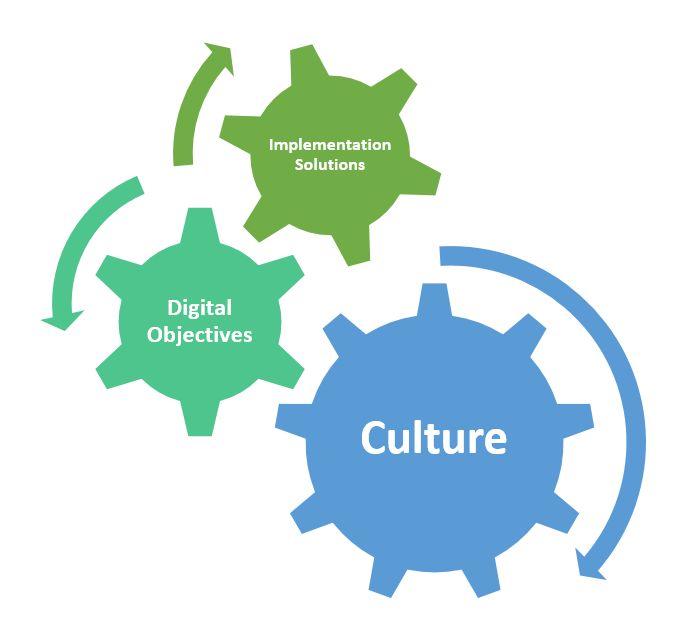How can universities help industries to digitalize? Lessons from a knowledge transfer project
- Centre for Operations and Supply Chain Research

In this blog post, I would like to share lessons learned from an Accelerated Knowledge Transfer to Innovate (AKT2I) project funded by Innovate UK. The AKT2I scheme was designed to create short-term collaborations between a business partner and a UK Knowledge Base to rapidly inject innovation capacity.
Running from December 2022 to March 2023, this was a scoping project that aimed to map the business information needs and processes of LBBC Group, a local family-owned manufacturing business of over 140 years that supplies a variety of industries and companies, including Rolls Royce and BAE Systems. With a couple of years of digital transformation experiences in the ICT industry and a Merit MBA degree from Leeds University Business School, I was hired as a digital transformation associate (DTA) for the project, supervised by Professor Chee Yew Wong and Dr Jyoti Mishra from the Centre for Operations & Supply Chain Research (COSCR) at Leeds University Business School.
I feel fortunate to have had a chance to work with the LBBC group. The business owners and directors were aware that digitalisation is an essential step to increasing revenue and reducing operational costs. They wanted to eliminate duplication of data entry and processing activities through various forms (eg papers, different information systems, workaround the existing Enterprise Resource Planning (ERP), etc.). They wanted to use efficient and accurate information to make decisions, but the company’s current ways of working made it hard to do so.
Through the AKT2I project, I completed a comprehensive review and mapping of existing business information systems and business processes. I conducted semi-structured interviews with thirty-two staff across multiple functional teams throughout the four divisions of LBBC Group. By working full-time at LBBC Group, I also learned a lot through observations and participation in meetings.
I used the results of my research to define the scopes and requirements of a larger company-wide digital transformation project that aimed to significantly improve productivity. In addition to the deliverables for the funder, Innovate UK, I completed a comprehensive report for LBBC Group, identifying current problems in the organisation and providing some solutions to LBBC Group.
The project also involved scoping for a potential ERP implementation. Through engaging with several ERP vendors, I produced a comparison of vendors for LBBC Group to decide the next step.
I found out that the problems were not merely in the information systems themselves; it was also about the company’s digital culture. LBBC Group has a corporate culture that pursues high-quality products to satisfy its customers. Staff had developed processes, functional roles, internal terminologies, and routines supported by paperwork, workarounds, multiple file folders and meetings. These practices have become the norm and are difficult to change. Such a culture makes it hard sometimes to track delays, errors, and operating costs. Even though the organisation recognised the potential of cutting-edge digital technology, changing ingrained culture is challenging. Corporate culture can deeply impact every activity.
Reflecting on my experience in the AKT2I project, in addition to uncovering problems and proposing potential solutions, I realised that digital transformation in an organisation has three interactive factors (Figure 1): Digital Objectives, Implementation Solutions, and Corporate Culture. These three factors are impacted by each other (without sequence).

Figure 1, created by the author – “three factors of digitalisation”.
In just a few months, the project introduced the concept of digitalisation to the staff and influenced a change in the directors’ initial digitalisation objectives. Several significant changes were observed. First, the directors’ trust in my knowledge and experience grew and they were receptive to input from my academic supervisors.
Second, certain team leaders took proactive steps in exploring digital solutions, engaging in active discussions with me rather than passive learning.
Third, the initial goal of digitalisation transformation was extended from an ERP system implementation to adopting other techniques for improving efficiency and performance, including customer relationship management (CRM) software.
Resistance to change was prevalent among certain teams – something which I was able to assess from the informal and formal meetings I had with team leaders and other employees across the divisions. Competing business priorities sometimes took over, which delayed some tasks in the project. I identified sub-cultures in different teams and divisions, prompting me to consider effective strategies to address resistance within the organisation.
In a family-owned business, instructions from the top management (top-down approach) are a common and quick way to get things done. However, I realised some stakeholders were motivated by their own drives to improve or learn new technologies. Collaborating with these individuals helped alleviate resistance and facilitate the transition process.
As an “outsider” joining the organisation briefly, I realised fostering relationships and building trust was one of the key dimensions to reduce resistance to change. Not all resistance was about digitalization; there were inherited sub-groups (cultures requiring integration with other teams).
With support from Professor Wong, I followed the Supply Chain Operations Reference (SCOR) model to map existing business processes. The SCOR model was the pillar during the entire project in stakeholder awareness, data collection, data analysis, and solution exploration. Dr Jyoti Mishra helped me clarify the framework and content of each deliverable.
I was pleased to be able to identify problems and provide solutions to LBBC to help the company with their digitalisation process, but I also personally gained a lot from the AKT2I project. The project dramatically enhanced the integration of my previous industry experience and academic knowledge.
What I learned from this project exceeded my expectations on several fronts: first, I learned a lot about the UK business environment and effective negotiation strategies, which are typically only fully grasped through real-world business practice.
Second, I successfully applied both external knowledge and insights from my MBA program and AKKT2I academic mentors, transferring knowledge from a university to a business, whilst deepening my understanding to a significant extent.
Third, I developed my understanding of the mainstream (ERP, CRM) systems in the market including their features, service and support, implementation capacity, and pricing model.
Fourth, the AKT2I project accelerated my integration into the UK community. As an overseas graduate, I don't have any family or relatives in the UK. The university was my sole support which provided me a chance to work with local companies.
After the AKT2I project finished, I continued working with LBBC Group as a knowledge transfer associate (through a Knowledge Transfer Partnership funded by Innovate UK). I would never have been able to achieve this accomplishment in such a short time if it wasn't for the support of the academic team at the University of Leeds.
Contact us
If you would like to get in touch regarding any of these blog entries, or are interested in contributing to the blog, please contact:
Email: research.lubs@leeds.ac.ukPhone: +44 (0)113 343 8754
Click here to view our privacy statement. You can repost this blog article, following the terms listed under the Creative Commons Attribution-NonCommercial-NoDerivatives 4.0 International licence.
The views expressed in this article are those of the author and may not reflect the views of Leeds University Business School or the University of Leeds.

